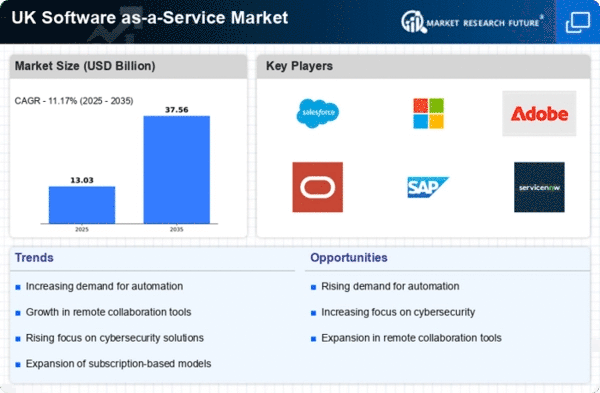Enhanced Customer Experience
The software as-a-service market is significantly influenced by the emphasis on enhancing customer experience. UK businesses are increasingly leveraging SaaS solutions to provide personalised services and improve customer interactions. By utilising data analytics and customer relationship management tools, companies can tailor their offerings to meet specific client needs. This focus on customer-centric strategies is likely to drive market growth, as organisations that invest in SaaS solutions report higher customer satisfaction rates. In fact, studies indicate that businesses utilising SaaS for customer engagement experience up to a 30% increase in customer retention, underscoring the importance of this driver in the software as-a-service market.
Cost Efficiency and Scalability
Cost efficiency remains a pivotal driver in the software as-a-service market. Companies in the UK are increasingly recognising the financial advantages of adopting SaaS solutions, which often eliminate the need for substantial upfront investments in hardware and software. Instead, businesses can opt for subscription-based models that align with their operational budgets. Furthermore, the scalability of SaaS applications allows organisations to adjust their usage based on fluctuating demands, which is particularly beneficial in a dynamic economic environment. This flexibility is expected to contribute to a projected growth rate of 20% in the SaaS sector over the next few years, as more companies seek to optimise their IT expenditures.
Integration with Legacy Systems
The integration of software as-a-service solutions with existing legacy systems is emerging as a significant driver in the market. Many UK organisations are faced with the challenge of modernising their IT infrastructure while still relying on established systems. SaaS providers that offer seamless integration capabilities are likely to gain a competitive edge, as they enable businesses to transition to cloud-based solutions without disrupting their operations. This trend is indicative of a broader movement towards digital transformation, with a projected increase in SaaS adoption rates of around 18% as companies seek to enhance operational efficiency and reduce costs. Thus, the ability to integrate with legacy systems is a crucial factor influencing the software as-a-service market.
Growing Demand for Remote Work Solutions
The software as-a-service market is experiencing a notable surge in demand for remote work solutions. As businesses in the UK increasingly adopt flexible work arrangements, the need for cloud-based applications that facilitate collaboration and productivity has intensified. According to recent data, the market for remote work software is projected to grow by approximately 25% annually. This trend is driven by the necessity for teams to communicate effectively, share documents seamlessly, and manage projects from various locations. Consequently, software as-a-service providers are innovating to offer comprehensive solutions that cater to these evolving needs, thereby enhancing their market presence and competitiveness.
Regulatory Compliance and Data Governance
Regulatory compliance is a critical driver impacting the software as-a-service market. With the increasing complexity of data protection laws in the UK, businesses are compelled to adopt SaaS solutions that ensure compliance with regulations such as GDPR. This necessity for adherence to legal standards is prompting organisations to seek out software providers that offer robust data governance features. As a result, the demand for compliant SaaS applications is expected to rise, potentially leading to a market growth of 15% in the coming years. Companies that prioritise compliance not only mitigate risks but also enhance their reputation, making this a vital consideration in the software as-a-service market.
















